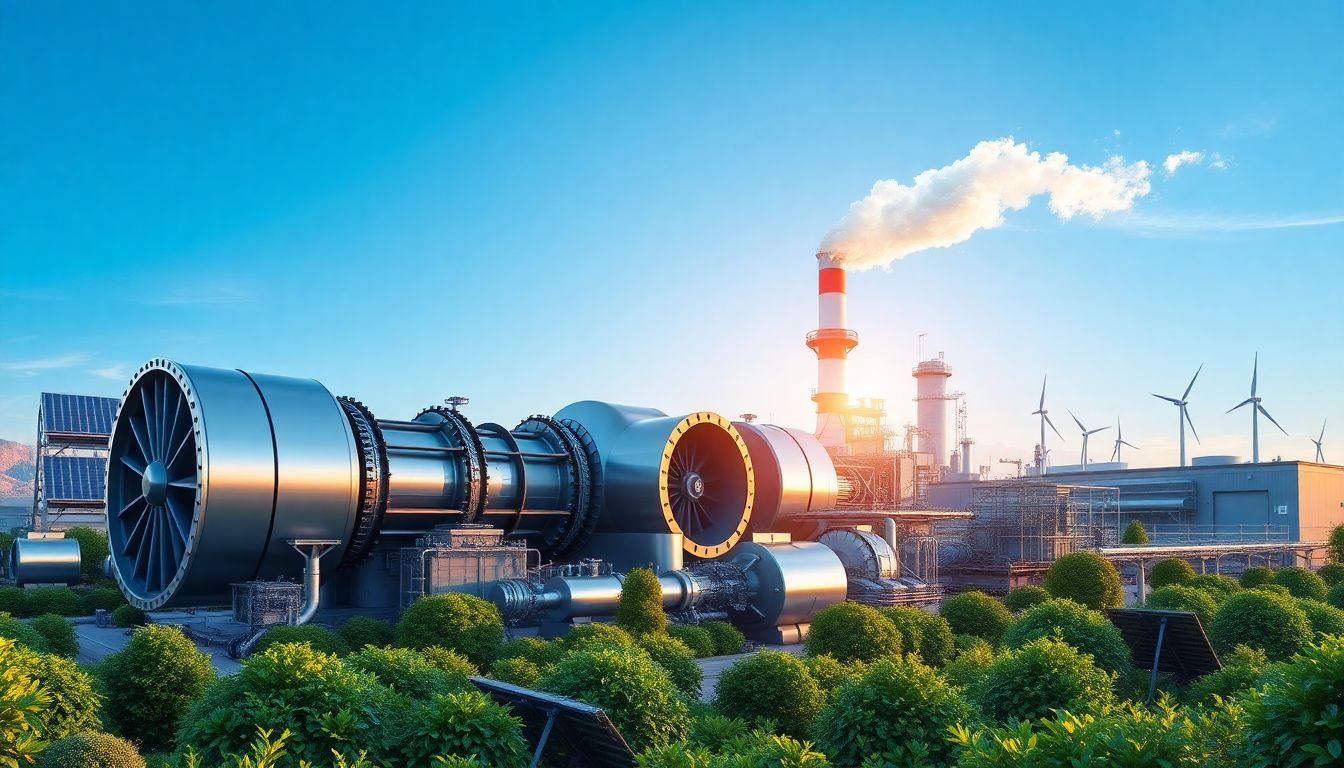The Impact of Turbomachinery in Reducing Industrial Carbon FootprintIssuing time:2025-05-05 10:18Author:JXEM
IntroductionThe world faces a big challenge: cutting down industrial carbon emissions to fight climate change. Industries are responsible for a large share of greenhouse gases. To meet climate goals, they need smarter ways to produce energy more cleanly. That’s where advanced engineering tools like turbomachinery come into play. Modern turbines, compressors, and pumps can boost energy efficiency and lower pollution. Using these innovations helps industries not just do better for the planet but also save money in the long run. The Role of Turbomachinery in Industrial Energy SystemsUnderstanding Turbomachinery: Types and FunctionsTurbomachinery includes machines like turbines, compressors, and pumps. Think of turbines as motors that convert energy from fluid flow into mechanical power. Compressors squeeze air or gases to help fuel engines or machines. Pumps push liquids through pipelines. These machines power many industrial processes. They are vital in sectors like oil, gas, electricity, and manufacturing. Without them, many industries simply wouldn’t run efficiently. How Turbomachinery Enhances Energy EfficiencyWhen designed well, turbomachinery can use less fuel and electricity. It turns energy into work more smoothly and with fewer losses. For example, a highly efficient gas turbine can generate more power with less fuel, cutting emissions. Some factories have improved efficiency by upgrading to modern compressors with aerodynamic blades. Regular maintenance keeps machines running at optimal levels. These small tweaks add up to big savings in energy and emissions. Contribution to Industrial DecarbonizationTurbomachinery also helps integrate renewable energy sources. Wind turbines and hydroelectric plants often rely on turbines. They make it easier to switch from fossil fuels to cleaner options. In bioenergy plants, specialized turbines convert biomass into usable power. This means industries can produce electricity without adding to carbon pollution. Using turbomachinery in this way makes cleaner energy more practical for big factories. Innovations in Turbomachinery for Emission ReductionAdvanced Materials and Design TechnologiesNew materials like lightweight composites and durable alloys help turbines operate more efficiently. They reduce energy losses caused by heat and friction. Aerodynamic improvements in blade shapes make turbines work better with less fuel. These design tweaks mean power plants emit fewer greenhouse gases while generating more energy. Smart and Digital TurbomachineryToday, sensors and data tools help operators monitor turbines in real time. Using IoT and AI, plants can detect issues before they cause breakdowns. This kind of smart management cuts down on unnecessary downtime and reduces emissions from inefficient operation. It’s like giving turbines a health check-up every moment, keeping them running cleanly and smoothly. Integration with Renewable EnergyTurbomachinery now fits into greener energy systems. For example, bioenergy plants use specialized turbines to convert organic waste into electricity. Wind turbines harness wind power through advanced gearboxes and generators that minimize energy loss. Even solar farms rely on turbines in concentrated solar power systems. These innovations make renewable energy more reliable and accessible, helping industries cut their carbon footprint. Environmental and Economic Benefits of Modern TurbomachineryReduction in Carbon EmissionsSwitching to modern turbines can cut carbon emissions significantly. Reports show that upgrading older equipment could reduce industry-related emissions by up to 30%. In chemical plants, replacing outdated compressors lowered CO2 output while boosting productivity. Such improvements prove modern turbomachinery is a clear step toward cleaner industry. Cost Savings and ROIInvesting in efficient turbines isn’t just good for the environment; it also saves money. Lower energy consumption means lower utility bills. Many governments offer grants or tax breaks for upgrading to greener tech. Over time, savings grow as energy costs stay high. The return on investment can be quick, making it a smart move for companies trying to stay competitive. Compliance with Environmental RegulationsGovernments worldwide tighten rules on emissions. Industries must meet these standards or face penalties. Modern turbomachinery helps companies stay ahead of regulations. By reducing pollutants and greenhouse gases, they avoid fines. They also enhance their reputation by showing commitment to sustainable practices. Challenges and Future OutlookCurrent Barriers to AdoptionCost is a big hurdle for many firms. High-tech turbomachinery can be expensive upfront, even if it saves money later. Some industries hesitate because the technology isn’t fully mature yet. Skill gaps also exist; workers need training to operate advanced systems. Resistance to change from traditional methods slows progress. Emerging Trends and Future InnovationsHybrid systems combining traditional turbines with electric motors are emerging. These offer faster startup and shutdown times and better efficiency. AI and machine learning will soon optimize turbine operation for maximum energy savings. Expect to see turbines that adapt themselves to changing loads and conditions automatically. Recommendations for Industry StakeholdersTo make real progress, everyone has a role. Manufacturers should invest more in research and new tech. Operators need to prioritize upgrading old equipment. Policymakers can create incentives and supportive policies. Together, these actions will push industries toward a more sustainable future with cleaner energy solutions. ConclusionTurbomachinery is key to reducing our industries’ carbon emissions. It makes energy production more efficient while supporting renewable sources. Innovations in materials, design, and smart technology continue to improve performance and cut pollution. By embracing these solutions, industries can save money and grow greener. It’s time for leaders in manufacturing, energy, and policy to join forces and adopt smarter, cleaner turbomachinery. The planet needs us to act now for a sustainable future.
Article classification:
Industrial trends
|

